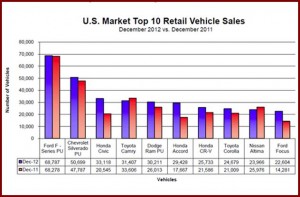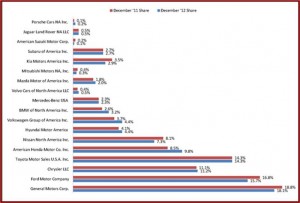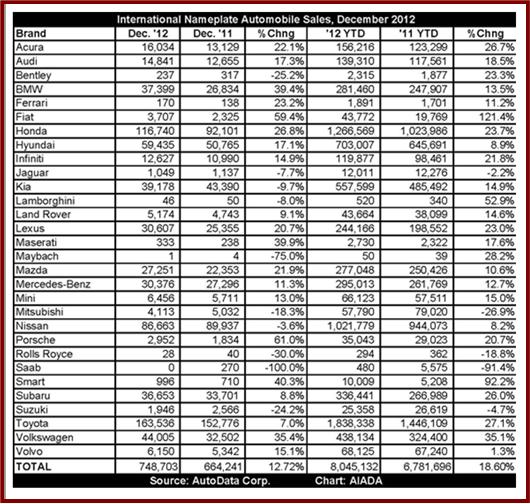
Once you get past the Detroit Three’s deserved strength in pickup trucks, a market shifting to cars and crossovers is playing to the strengths of the Japanese brands.
In what turned out to be the best auto sales year since pre-Great Depression 2007, offshore auto brands captured 55.5% of the U.S. auto market, while the Detroit Three lost the ground they gained in 2011 and held only 44.5% of new vehicle sales. To be sure, some of the givebacks were the result of the resurgent Japanese automakers Toyota, Honda and Nissan, who are no longer hampered by natural disaster production disruptions, but equally in play were significant Japanese new product introductions in virtually all of the high volume crossover and family car segments, which are thriving.
According to sales numbers from the consultancy AutoData, imported nameplates grew at more than twice the rate of domestic ones by selling more than 8 million light vehicles for a +19% gain compared to 2011; the Detroit Three sold 6.5 million light vehicles, up from 5.99 million for a 7.5% increase compared to 2011.
For the year, offshore brands sold an average of five of the top ten selling vehicles in the U.S. In December, six of the top ten selling vehicles were international nameplates. In third place behind the Ford F-150 and Chevrolet Silverado pickups, the Honda Civic continued to dominate the Toyota Camry as the top-selling car in the U.S. Honda’s compact – widely panned by the mainstream auto media, was up 61.2% over last December.
In sixth place, the Honda Accord also continued to experience significant improvement compared to last December. Sales for the midsize sedan were up 66.6%. The Honda CR-V, Toyota Corolla/Matrix, and Nissan Altima – in seventh, eight, and ninth places, respectively – rounded out the offshore brand showing for the month.
AutoData estimated that the seasonally adjusted annual rate or SAAR for December was at 15.37 million units, an improvement over 13.61 million units one year ago. Sales for all brands, unadjusted for business days, were up 9% from December 2011 and 13.4% year over year.
“Dealers are confident that this positive momentum will continue into 2013, and that the retail market still contains substantial room for growth,” said AIADA President Cody Lusk.



